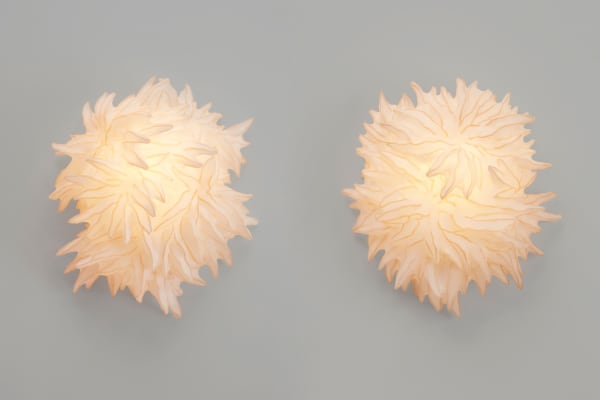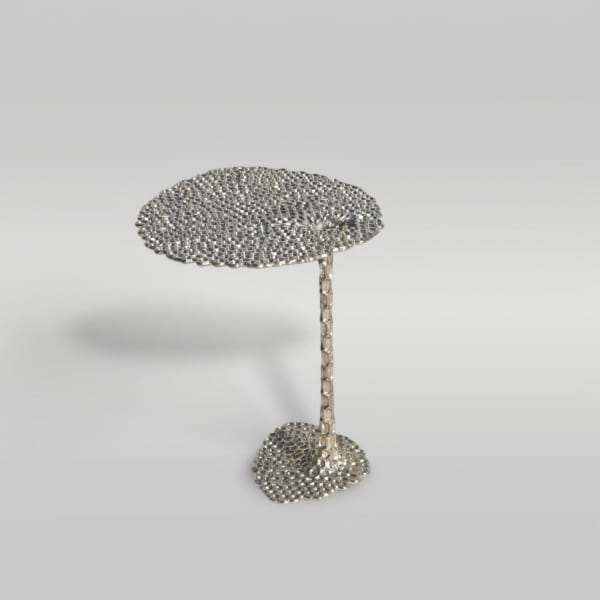Ayala Serfaty
Since the 1990s, Ayala Serfaty has developed a distinctive language at the intersection of art and design, transposing the essence of the natural world into her creations. Her work is rooted in a long-term exploration of cellular structures and organic abstraction.
Glass, felt, and bronze — three materials chosen for their timeless qualities — serve as the vectors of a personal investigation that revives the energies of ancestral traditions through innovative and unexpected approaches. Her practice, resolutely unconventional, gives form and substance to the breath of life, while uniting vision and function.
Internationally renowned, her luminous sculptures ‘Soma’ — “the human body” in Greek — combine intricate hand-woven glasswork with a captivating immateriality. Each piece is made from thin glass rods shaped by flame, fused together to form a delicate glass lace. This lace is then enveloped in a fine polymer veil that diffuses the light. The glass veins, still visible beneath the translucent polymer skin, embody both the strength and fragility of the human condition.
Evoking clouds, corals, foliage, or snow crystals, these luminous sculptures — as well as her recent ‘Janus’ bronze tables — are based on cellular structures that grow by proliferation, echoing the dynamics of living systems. Transfigured into a refined, openwork pattern, the glass and bronze express the essence of the invisible and the spiritual. The biomorphic becomes intangible; the medium remains a mystery.
Her work with felt follows the same intimate connection to nature and time. As the first textile ever crafted by humans from wool and silk fibers, felt requires no machinery. Ayala Serfaty reinterprets this primal material, composing — like a painter with a palette — custom colors and textures for each seat. The result is an organic pattern, always unique, that transcends categories: rocky terrain, tree bark, animal skin, or bird plumage. This body of work, titled ‘Rapa’ — “the healer” in Hebrew — echoes the notion of protection dear to Joseph Beuys, who claimed that felt had saved and healed him during World War II.
Ayala Serfaty was born in Tel Aviv in 1962. She holds a degree in Fine Arts from the Bezalel Academy of Art and Design in Jerusalem and from Middlesex Polytechnic in London. Her work has been exhibited in numerous museums, including the Design Museum in London, the Cooper Hewitt Museum in New York, and the Centre Pompidou in Paris.
Her pieces are part of the permanent collections of the Musée des Arts Décoratifs in Paris, as well as many institutions in the United States: the Metropolitan Museum of Art (New York), the Museum of Arts and Design (New York), the Museum of Fine Arts (Boston), the Museum of Fine Arts (Houston), the Mint Museum (Charlotte), the Corning Museum of Glass, and the Indianapolis Museum of Art.
-
 Ayala SerfatyShastool Pre II, 2025
Ayala SerfatyShastool Pre II, 2025 -
 Ayala SerfatyNada, 2022
Ayala SerfatyNada, 2022 -
 Ayala SerfatyTara III, 2022
Ayala SerfatyTara III, 2022 -
 Ayala SerfatyClear, 2021
Ayala SerfatyClear, 2021 -
 Ayala SerfatySangha, 2021
Ayala SerfatySangha, 2021 -
 Ayala SerfatyTara Lehdu, 2021
Ayala SerfatyTara Lehdu, 2021 -
 Ayala SerfatyKuramura Pollock, Black and White, 2020
Ayala SerfatyKuramura Pollock, Black and White, 2020 -
 Ayala SerfatyChaga, 2018
Ayala SerfatyChaga, 2018 -
 Ayala SerfatyJusto G, 2018
Ayala SerfatyJusto G, 2018 -
 Ayala SerfatyMika Leh Due, 2018
Ayala SerfatyMika Leh Due, 2018 -
 Ayala SerfatyAnu
Ayala SerfatyAnu -
 Ayala SerfatyAsh
Ayala SerfatyAsh -
 Ayala SerfatyClear
Ayala SerfatyClear -
 Ayala SerfatyClemens
Ayala SerfatyClemens -
 Ayala SerfatyConsola
Ayala SerfatyConsola -
 Ayala SerfatyInterAre
Ayala SerfatyInterAre -
 Ayala SerfatyKuramura Pollock (Ocean)
Ayala SerfatyKuramura Pollock (Ocean) -
 Ayala SerfatyMaris III
Ayala SerfatyMaris III -
 Ayala SerfatyOnce II
Ayala SerfatyOnce II -
 Ayala SerfatySankara
Ayala SerfatySankara -
 Ayala SerfatyShastool Fly
Ayala SerfatyShastool Fly -
 Ayala SerfatyShastool Nunhead
Ayala SerfatyShastool Nunhead -
 Ayala SerfatyShastool Pre I
Ayala SerfatyShastool Pre I -
 Ayala SerfatyShastool Will
Ayala SerfatyShastool Will -
 Ayala SerfatyTara
Ayala SerfatyTara -
 Ayala SerfatyThe Rest of Day
Ayala SerfatyThe Rest of Day -
 Ayala SerfatyThe Rest of Night
Ayala SerfatyThe Rest of Night -
 Ayala SerfatyThe Rest Of Noon
Ayala SerfatyThe Rest Of Noon -
 Ayala SerfatyWomaka
Ayala SerfatyWomaka
































